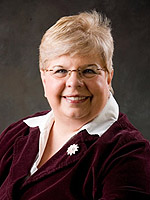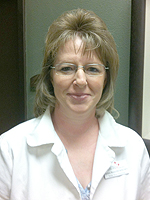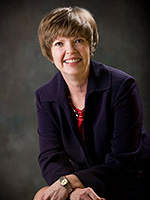Advocating, Learning, Caring: A Tribute to Our Nurses

Brice is an associate professor in the School of Nursing.
Linda Brice, R.N., Ph.D.
Q: How long have you been a practicing nurse?
A: I started practicing nursing in January 1990 almost 22 and a half years ago. I started teaching at the School of Nursing Dec. 1, 2002, about 9.5 years ago.
Q: How has nursing changed since you began your nursing career?
A: Technology, technology, technology. The technology in nursing has far surpassed what it was when I first became a nurse more than 20 years ago. Also, diseases have changed. Some infections such as the childhood diseases of measles, mumps and chicken pox have almost been eradicated, but other diseases and infections such as STDs/HIV, Hepatitis B and C, Type 2 diabetes, childhood obesity, heart disease and certain cancers are getting worse and are affecting much of the population. Some STDs now affect one in every two U.S. adults and teens. Type 2 diabetes is now invading our children, not just adults, and in parts of the world HIV/AIDS is killing half of the population. Medicine is evolving and nursing along with it.
Q: What excites you most about the future of nursing?
A: The nursing students who will graduate next year will see a wonderful future in the medical field. Nurses are going to take on a greater responsibility in the care of patients. As advanced practice nurses, they will be responsible for the care of many more Americans. In the hospitals, nurses will be part of a more organized interprofessional team of health care providers caring for each patient. The electronic age of medicine is just gearing up and nurses will be at the forefront of that technology. I am so proud of our nursing students and our nursing alumni and how they have also geared up for the changes in nursing and medicine.
Q: What is your specialty? Why did you choose that specialty?
A: My original specialty was being a labor and delivery nurse. As a nurse educator, my specialties have grown to community health/public health nursing and high-risk obstetrics to go along with my specialty of labor and delivery.
I was almost 38 years old when I became a nurse and by that time my son was 13 years old. But the memories of his tragic birth were burned in my mind forever. I had a terrible, emergency birth to save my son’s life after the possible incompetence of my military OB-GYN. Because of him, my son was born with APGAR scores of three and seven, severe hypoxia and a lifetime of learning disabilities and dyslexia. When I decided to become a nurse later in life, I wanted to work as a labor and delivery nurse so that, if at all possible, another pregnant woman would never have to go through what myself and my son had to go through.
Q: What is something about nurses that people may not know?
A: Nurses are not just caring, knowledgeable and skilled, they are also fearless like a momma bear watching out for their cubs. Nurses are the best advocate for their patients and that is where the fearlessness comes in to play.
Q: How do you embody this year’s national Nurses’ Week Theme, “Nurses: Advocating, Leading Caring?”
A: I try and teach my students how to be great advocates for their patients by not only caring for them in the hospital but also to know where they came from in the community and where they will be going back into the community when they are discharged. You cannot be an advocate if you do not know about your patient and their background. This is what makes a nurse truly caring, and a leader in their field.
Q: If you weren’t a nurse, what career would you have chosen instead? Why?
A: Since nursing is my third career, I have already had two other careers before I became a nurse. I was an officer in the United States Air Force for more than 12 years. During that time I was a squadron commander, executive officer and a foreign liaison officer working with military members from 24 different nations.
After getting out of the military, I owned my own unfinished furniture store in Abilene called “Bare Necessities.” It was during the recession in the mid-1980s that most small businesses went under, including mine. It was also the last time there was a terrible nursing shortage, where hospitals in Texas actually closed down floors and entire hospitals because there were not enough nurses. That is when I decided to go into nursing.

Moyer is a nurse practitioner at the School of Nursing's Sunrise Canyon clinic.
Christa Moyer, NP
Q: How long have you been a practicing nurse?
A: I will be celebrating my 20th year as a registered nurse on May 18.
Q: How has nursing changed since you began your nursing career?
A:When I graduated from nursing school in 1992 my class was the last year to wear the white caps and white nursing scrubs in our school. We were also the last class to take the NCLEX test with pencil and paper. The following year they went to computerized testing. So in this regard nursing has changed in ways that I believe to be for the positive. Although I believe white was meant to symbolize cleanliness, it really was very impractical for all the duties required of a nurse. The other very positive change I have seen is the increase in nursing salaries. I started working for $8.75 an hour as a new graduate and got a 12 cent raise when I passed my NCLEX. The other wonderful part of nursing is the electronic medical record. I can remember staying hours after work to finish hand writing nursing notes.
Q: What excites you the most about the future of nursing?
A:The future of nursing is exciting to me because the sky is the limit. So many opportunities are open to nurses, in all levels of nursing. I have friends that are employed in so many different areas of health care, including jobs with health insurance companies, beef packing plant clinics for employees, tele health, online health advice sites and so many more. Nurses are no longer only found in the traditional hospital and clinic settings. Large companies are learning that on-site clinics cut down on employee lost time at work.
Q: What is your specialty? Why did you choose that specialty?
A:I chose to specialize in family practice because I wanted to work with all ages of patients. I also thought it would give me the most opportunities to find the right job for me.
Q: What is something about nurses that people may not know?
A: Something people may not know about nurses is that they will eat anything put in the lounge. I used to bring everything my kids wouldn’t eat or didn’t like and put it in our lounge and it would be gone in a few hours.
Q: How do you embody this year’s National Nurses Week theme, “Nurses: Advocating, Leading, Caring”?
A: This year’s National Nurses week theme, “Nurses: Advocating, Leading, Caring”; is a true picture of what nursing is and what nurses do on the job every day. We many times care for patients at their most vulnerable moments, in discomfort, in illness, in death. Nurses take the responsibility of advocating for those patients that many times cannot speak for themselves, or who find themselves in situations with their health that they don’t know what to ask for.

Mello is an assistant professor in the School of Nursing.
Inola Mello, R.N., DNP, FNP
Q: How long have you been a practicing nurse?
A: I have been in nursing since 1987. I graduated with a Bachelor of Science in Nursing from TTUHSC and began working in the trauma center of what was then Lubbock General Hospital, now known as University Medical Center.
Q: How has nursing changed since you began your nursing career?
A: So many things have changed since I began my career. One small example of how much things have changed is that when I started working as a registered nurse in a trauma center in 1987, there was no such thing as universal precautions. We only wore gloves when we knew we would be exposed to body fluids and there were no gowns or masks even available to us. Needles were routinely recapped and there was no safety anything. It's hard to imagine that so many changes have occurred during my career.
Q: What excites you most about the future of nursing?
A: Nurses (hopefully) are finally being recognized as a true part of the health care team. Nurses have always known that without us, health care would be like a train without a track.
Q: What is your specialty? Why did you choose that specialty?
A: I am a family nurse practitioner. In 1994, I went back to school for my Master of Science in Nursing and nurse practitioner education. Honestly, I believe the role of nurse practitioner chose me instead of the other way around. I felt compelled to advance my education so that I could provide a patient centered aspect of care that was not often seen in primary care at that time.
Q: What is something about nurses that people may not know?
A: All nurses are not alike.
Q: How do you embody this year's National Nurses Week theme, "Nurses: Advocating, Leading, Caring?"
A: I have fought for patient rights for as long as I can remember. It used to be unheard of to have a family presence at the bedside during any type of emergent procedure. The goal of my care is to make sure that I understand what is important to the patient and their families. I want to make sure that I help plan patient's care based on their culture, values and beliefs.
Q: If you weren't a nurse, what career would you have chosen instead? Why?
A: As a career, there was never another option for me other than nursing. During my career as a nurse practitioner, patients have asked me if I was working on being a doctor. I have always been able to say that no, I am a nurse and will always be a nurse. I am now a 'doctor,' but I am a 'nurse doctor' and not a physician. Going to medical school would certainly have been easier in many ways, but nursing chose me instead.
Related Stories
Celebrating Veterans: TTUHSC’s General Martin Clay’s Legacy of Service and Leadership
From his initial enlistment in the Army National Guard 36 years ago to his leadership in military and civilian health care management roles, Major General Martin Clay’s career has been shaped by adaptability, mission focus and service to others.
Texas Tech University Health Sciences Center School of Nursing Named Best Accelerated Bachelor of Science in Nursing Program in Texas
The TTUHSC School of Nursing Accelerated Bachelor of Science in Nursing (BSN) program has been ranked the No. 1 accelerated nursing program in Texas by RegisteredNursing.org.
TTUHSC Names New Regional Dean for the School of Nursing
Louise Rice, DNP, RN, has been named regional dean of the TTUHSC School of Nursing on the Amarillo campus.
Recent Stories
National Academy of Inventors Names TTUHSC Faculty Senior Members
The National Academy of Inventors (NAI) has designated two current and one former TTUHSC faculty researchers as Senior Members.
The John Wayne Cancer Foundation Surgical Oncology Fellowship Program at Texas Tech University Health Sciences Center Announced
TTUHSC is collaborating with the John Wayne Cancer Foundation and has established the Big Cure Endowment, which supports the university’s efforts to reduce cancer incidence and increase survivability of people in rural and underserved areas.
TTUHSC Receives $1 Million Gift from Amarillo National Bank to Expand and Enhance Pediatric Care in the Panhandle
TTUHSC School of Medicine leaders accepted a $1 million philanthropic gift from Amarillo National Bank on Tuesday (Feb. 10), marking a transformational investment in pediatric care for the Texas Panhandle.
